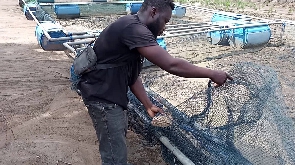Correspondence from Eastern Region
With most people in dilemma over the perfect business idea, fish farming has been identified as one of the most lucrative agricultural business ideas in Ghana.
The high consumption of fish in the midst of low supply means income is made on a consistent basis with a huge profit margin.
However, The challenge remains that persons desirous of venturing into fish farming have no idea about its potential.
GhanaWeb therefore visited the fish farm at the D'yeki Eco Village at Odumase Krobo in the Eastern Region to understand the benefits of fish farming.
We interacted with Miss Lydia Okrah, manager at the two-year-old fish farm, hoping to gain insights into her job, the farm, and the fish they produce for our meals.
Miss Lydia Okrah holds a Diploma in Agriculture and Aquaculture. Having been practicing fish farming for the past three years, she described the activity as a profitable venture. She noted, “Fish farming is profitable only if you have the interest and invest in it more especially the catfish, they grow very fast and they’re easy to manage.”
With about 5,000 fish including mostly catfish and tilapia in its ten tanks, the farm has reliable customers to whom it supplies its produce including hospitals, government institutions, restaurants, hotels, etc. Aside from that, members of the general public also walk in for a fish or two.
What makes the practice even more convenient, Miss Okrah added is that one does not need large acres of land to undertake the process, adding that a “small piece of land and concrete tank” is enough to contain 1000 fishes.
Dispelling perceptions that starting fish farming is capital intensive, she said, “It is not all that expensive, the little you have you can invest into it."
Depending on the sizes, at a minimum of six months, the fish are ready for harvesting, however, she said it takes up to a year or more if one wants them big.
With a kilo of catfish selling for about thirty-five cedis on the market, she described the business as lucrative as catfish from a certain age, can feed on all kinds of food, resulting in a reduction in the cost of feed.
Just like other ventures, fish farming however comes with its own peculiar challenges. One of them Miss Okrah mentioned is mortality where the fishes end up dying or the absence of a water body.
According to her, “The major challenges of fish farming are sometimes, you get mortalities whereby you would not know the main reason why they’re dying and sometimes water, where you are, where there’s no water you find it difficult because we all know that without water, fish cannot live.”
She however added that measures have been put in place to avert these as the farm is in the process of employing technologies to enhance productivity.
With the farm able to produce about 10,000 fish in a year, the manager said the fish farm is able to meet the demands of its customers.
Miss Okrah called on the youth to venture into fish farming as it is a lucrative means of income and easy to undertake.
There are also four earth ponds of large dug-outs at the eco-village holding different kinds of fish.
Explaining the advantages of the earth-pond against the tanks, Nunya Worlali, farm manager at the D'yeki Eco Village said the dug-outs serve as a natural environment for the fish is less cost-intensive and they also grow bigger than when produced in the tanks.
In Ghana, fish constitutes about 60 percent of animal protein in the diet.
Fish availability in Ghana consists of 47 percent harvested fish, 18 percent imports, 3 percent farmed fish, and 32 percent deficit.
As a fish farmer, therefore, this presents an opportunity to cash in on the fish farming project in the country.
Business News of Tuesday, 10 October 2023
Source: www.ghanaweb.com













